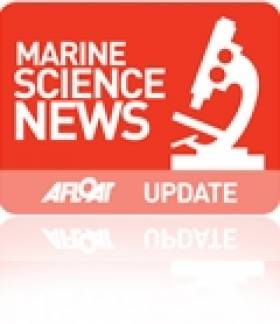Displaying items by tag: Sea Change – A Marine Knowledge, Research & Innovation Strategy for Ireland
Irish Marine Science Nets €23 million from Europe
This funding from the European Seventh Framework Programme (FP7) will support an estimated 130 young researchers, employment that is of even greater importance in these challenging economic times.
Commenting on the Irish marine research community's performance, Minister for Agriculture, Fisheries and Food Mr. Brendan Smith T.D. said, "Ireland's dramatic success in attracting EU funding to its marine science programmes was achieved by our strategic approach to marine science planning highlighting the National Marine R&D Strategy, Sea Change – A Marine Knowledge, Research & Innovation Strategy for Ireland 2007-2013, a key component of the Strategy for Science and Technology in Ireland (SSTI). It was also assisted by the strong influence the Ireland has brought to bear at European level on the shape of the FP7 that accommodates marine topics as a cross-cutting theme in all FP7 programmes."
This level of funding represents five times the leverage rate that might be expected from a country with Ireland's national investment in marine RTDI (2%) as well as a doubling of the EU grant aid awarded to Ireland's marine science sector under the previous Sixth Framework Programme (FP6), when 59 collaborative projects from Ireland were awarded €10.6 million in grant aid.
The Minister for Enterprise, Trade and Innovation, Mr. Batt O'Keeffe T.D., said, "The sea is arguably Ireland's greatest natural resource. Properly studied and managed, it can create jobs, generate economic revenue and supply the raw materials for new industries ranging from ocean energy and environmental monitoring technologies to marine-inspired pharmaceuticals and food ingredients. The award of funding for these projects show that partnerships between academics and small businesses can yield significant dividends and make an important contribution to the Government's plan for a smarter economy."
Over the years Ireland has gained respect in marine science at European level through its contributions to such key EU strategy documents as The Galway Declaration and the Integrated Maritime Policy and Marine Science Strategy.
"The combination of Ireland's talent for innovative thinking, combined with the enormous potential of our marine resources has already yielded results in terms of new and exciting enterprises with revenue and job creation potential," said Mr. Sean Connick, T.D. Minister of State at the Department of Agriculture Fisheries and Food. "My recent visit to the Marine Institute has convinced me of the excellent calibre of Irish marine scientists and that we as a people will benefit greatly from a strong long term commitment to science and the sea. I wish to congratulate the Irish marine research groups for their excellent performance to date in FP7."
Ireland's scientists and marine science administration play prominent roles in many European and international marine science bodies. Dr. Peter Heffernan, CEO of the Marine Institute, will provide a keynote address at the prestigious Belgian-EU Presidency EurOCEAN 2010 Conference in Oostende, Belgium next month, outlining progress in European maritime and marine science policy since the event was hosted by Ireland in Galway in 2004.
"With continued support at home, through ongoing commitment to national funding programmes such as Sea Change and an appropriate employment framework for 100% EU funded research posts, Ireland has the potential to build on these recent successes," said Dr. Heffernan.
























































